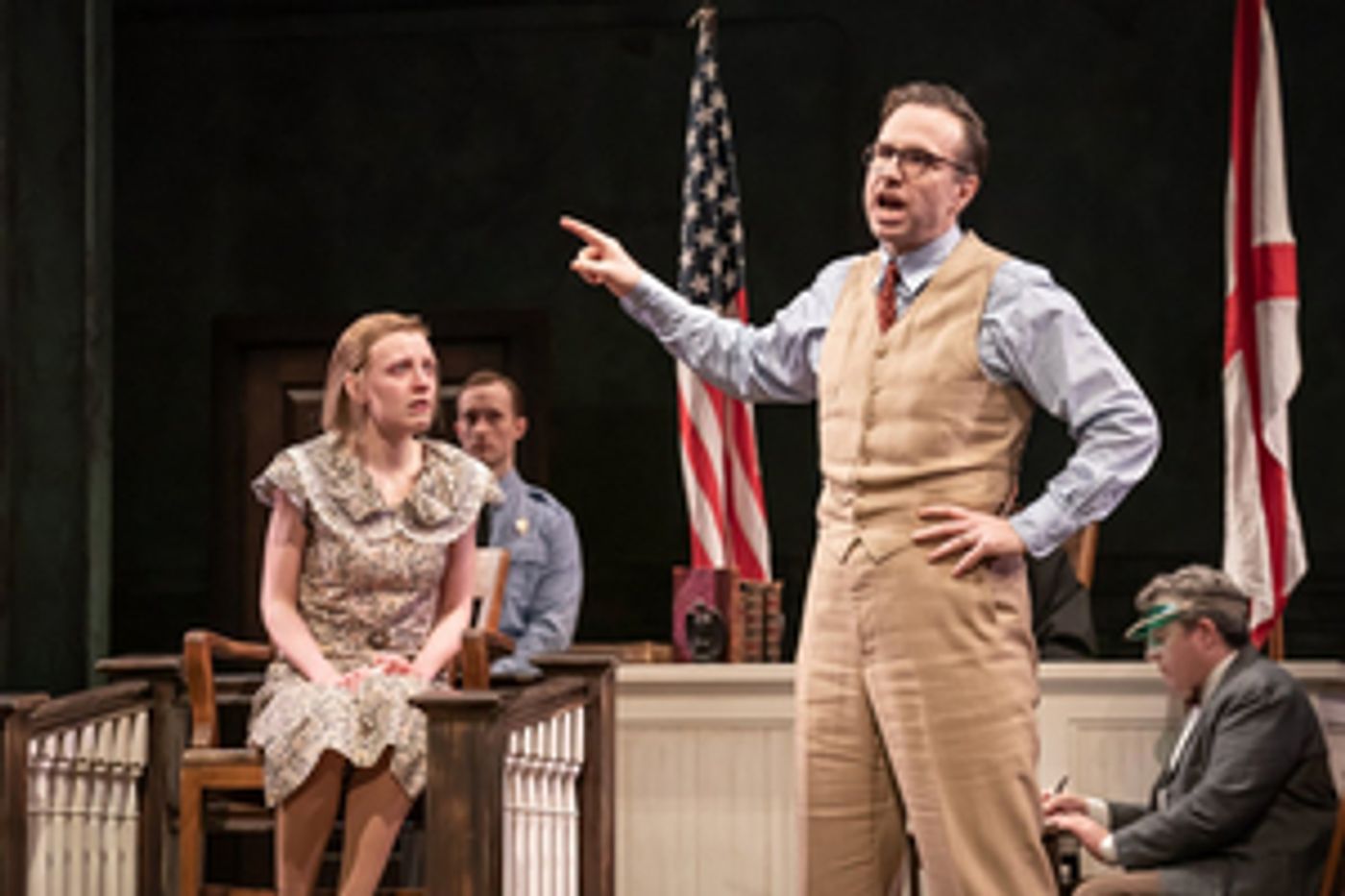Review: TO KILL A MOCKINGBIRD, Gielgud Theatre
Aaron Sorkin adapts Harper Lee's novel for stage

![]() Aaron Sorkin's hit Broadway adaptation of Harper Lee's seminal 1960 novel has finally reached us, following Covid delays and a few real-life legal dramas. Lee's estate sued Sorkin for making changes to the characters, while the since publicly disgraced (and removed) Mockingbird producer Scott Rudin bullied every other adaptation of Lee's book off the stage.
Aaron Sorkin's hit Broadway adaptation of Harper Lee's seminal 1960 novel has finally reached us, following Covid delays and a few real-life legal dramas. Lee's estate sued Sorkin for making changes to the characters, while the since publicly disgraced (and removed) Mockingbird producer Scott Rudin bullied every other adaptation of Lee's book off the stage.
After all that, how does Bartlett Sher's production stack up? Extremely well on the whole, particularly if you're a fan of Sorkin's fast-talking, quick-witted, generally white-saviour characters. Plenty of other Sorkin tropes are present too, like the irascible judge, and of course this is hardly his first courtroom drama.
In Sorkin's telling of the 1930s rural Alabama-set tale, Tom Robinson's trial dominates, which gives the play high stakes from the off. The rest of the story is told in flashbacks, Miriam Buether's cavernous warehouse set swiftly filling with courtroom furniture or the Finches' idyllic Southern porch. Those jumps are occasionally bewildering, but the new structure pays off in many ways.
Chief among them is the explicit blurring of the judicial and domestic settings. Atticus's conviction that Tom will be acquitted - the reason he talks Tom out of a guilty plea and a prison sentence - is based on the belief that his small-town "friends and neighbours" are essentially good and will do what is right. In fact, Tom is betrayed by a justice system that is poisoned by the townsfolk's stubborn, entrenched racism.
Tom is the black man falsely accused of rape by a poor white woman, Mayella Ewell, whose flimsy story is backed up by her pugnacious, bigoted father, Bob. Atticus sets out to defend Tom - watched on by his six-year-old daughter, Scout, older son Jem, and their friend Dill (based on Lee, her brother and her childhood friend Truman Capote), as well as by the family's black maid, Calpurnia.
Although the show is still to an extent a coming-of-age story for Scout, who narrates Lee's novel, Sorkin places Atticus - and his shattering loss of innocence - centre stage. It's not a perfect solution to the book's shortcomings, as viewed through a contemporary lens, but it's a startling subversion of the Sorkin hero. Atticus is clever, funny, articulate, kind, and largely in the right. And yet he badly misjudges the situation, with tragic consequences.
Of course, the consequences for Atticus aren't fatal. He loses his principled faith in people; Tom loses his life. But at least this adaptation gives Tom slightly more agency and a stronger voice - and Jude Owusu gives him great dignity without making him a saint.
The play becomes a fundamental indictment of passive, courteous, privileged white liberalism - of the notion that empathy or education, or both, will automatically sway the other side, or that the truth will win out in a world of raging passions and fake news. Instead of cosy nostalgia, this is a confrontational, timely play that asks uncomfortable questions.
Is our hero Atticus actually following a Trumpian "very fine people on both sides" line of thought when he tells his kids to respect everyone, even a Klan lynch mob? And in the wake of Black Lives Matter and #MeToo, of the alt-right resurgence and the attack on the US Capitol, Atticus's argument that we should patiently wait for change, instead of fighting, seems naïve at best, harmful at worst. Passivity, in his context, means blithely accepting segregation and violent prejudice.
In a beefed-up role, it's Calpurnia (a superb Pamela Nomvete) who bursts Atticus's idealist bubble. If he's respectful to racist oppressors, then he's disrespecting those they oppress, she points out. She also calls him on his own microaggressions towards her. This arrogant Atticus is far from perfect.
And Rafe Spall is phenomenal in the role. Clad in a pale linen suit, hair artfully rumpled and legs gracefully crossed, he's wonderfully charismatic, wry and thoughtful - a good father, a good lawyer, a good man. Yet Spall also seeds in his shortcomings. He's just a bit too pleased with himself, too much in love with his notion of decency and his man-of-the-people image. He doesn't realise how out of touch he is until it's far too late.
However, Sorkin makes the villainous characters, especially Bob Ewell, so irredeemable here that Atticus's blind spots are too glaring - even if Atticus does place them in context, lecturing condescendingly on the impact of the Depression and lingering humiliation of the Civil War. The shift in focus also makes the Boo Radley plot largely superfluous, adding to a near-three-hour runtime and muddying the climax. Plus it reduces the role of Lee's female protagonist (here all three kids narrate), especially as the show digs into what it means to be a man.
Nevertheless, Gwyneth Keyworth supplies a curious, fierce Scout, and there are strong performances throughout the ensemble: Harry Redding's defiant Jem, David Moorst's sweetly eccentric Dill, Poppy Lee Friar's visibly traumatised Mayella, and Lloyd Hutchinson's witness with a rich backstory.
Sorkin's take isn't subtle. He can't resist repeating and underscoring a point - sometimes literally, as with the final religious musical cue. But this gripping production places us in the jury box, deliberately left empty, and refuses to let us off easy. "All rise" isn't just a tagline: it's a challenge.
To Kill a Mockingbird is at the Gielgud Theatre until 19th November - book tickets here
Read our interview with David Moorst
Photo credit: Marc Brenner
Reader Reviews
Powered by
|
Videos


